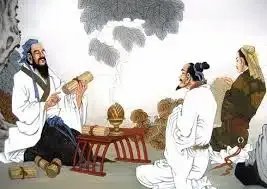
關注政治發展、社會生態!坚若磐石地與台灣人民🇺🇦站在一起!
【Event】Confucianism · Confucianism - Confucianism in the Times

Topic: Types of Confucianism in the Times: Serious Discussion/Mental Journey Scenario: The Analects of Confucius embedded in the golden sentence: "I am afraid that Ji Sun's worries are not within Zhuanyu, but within Xiaoqiang."
When I read Huang Renyu's Great History of China, I saw him comment: "In order to form a grassroots organization among the peasant masses, there is nothing more than advocating family unity (Confucianism)... So I think that individuals may act on the basis of self-interest (Yang Zhu) ), or treating others equally (Mozi), may be attractive to modern readers, but impractical in ancient China.”
When I started reading "A Brief History of Chinese Philosophy" myself, I found that I really read the parts of Taoism and Mohism very seriously, and I jumped very fast when I read the parts of Confucianism. Think about it, for modern people, pragmatic content, especially content that needs to be understood in conjunction with the background of the times, is often not very attractive. Those ideal contents are more likely to find resonance across the times.
In school, I was also tormented by Confucian classics, and sometimes I wondered what the meaning of these contents was. For example, this "Analects of Confucius - Ji Shi" should be familiar to everyone by now:
Ran You said: "Today's husband Zhuanyu is solid and close to fee. If you don't take it now, future generations will worry about your descendants." Confucius said: "Please! Those who have a country and a family do not suffer from widowhood but unevenness, and poverty and insecurity. They all have no poverty, harmony and widowhood, and peace and tranquility. This is the case, so people from afar are not satisfied, and they have cultivated morality since then. , then you will be at peace. Now you have to ask for it, and I will be with you. People from afar will not accept it and cannot come; the state will fall apart and cannot be defended. Instead, we plan to fight within the state. Inside."
In the state of Lu at that time, Confucius' criticism of Ji's family was reasonable, but how many children would go deep into the historical background of that time? How many children can understand this criticism in combination with the feudal system of the Spring and Autumn Period, the background of the Sanhuan dictatorship and the theory of Confucius' rectification of names? So the students only remembered the dogma that "do not suffer from widowhood, but suffer from inequity", "if those who are far away refuse to accept it, then cultivate morality", which sound catchy and conform to the values of today's people to some extent.
In the Spring and Autumn Period and the Warring States Period, when rituals and music were broken, Confucians proposed a relatively conservative plan to rebuild order. Such a scheme was considered unrealistic preaching at the time, and is now considered to represent the "shackles" of tradition. Max Weber once pointed out that Confucian ethics hindered the development of capitalism, and the corresponding Protestant ethics he advocated. Is this really the case? I think the economic development of East Asia so far has been enough to put the coffin in the ground for such a view.
In fact, Confucianism has never been successful in the era when it was born. It was not the era it was in that chose it, but the rulers of later generations. What earned it its place was its foresight - when the turmoil came to an end, the rulers needed to construct a pragmatic social order. Culture is never static, it is a process of constant introduction, interaction, reinterpretation, rediscovery and recreation. Just like the "chivalrous culture" of the same period as Confucianism. When Han Feizi said that "Confucianism uses literature to violate the law, and chivalry uses martial arts to violate the prohibition", he may not have thought that a culture such as "wuxia" will rise again in the contemporary era. However, is the contemporary "martial arts" the same thing as the Han Fei era's "Knights are banned by martial arts"?
In fact, in my opinion, history, thought and culture are more like a huge resource pool, from which people extract what they need, constantly transform them, and then serve new needs. Getting too attached to conservative "orthodoxy," or radical "decoupling," will only push yourself further away from what's truly precious. Perhaps it is not traditional ideology and culture like Confucianism that binds people, but the paranoia and shortsightedness of people themselves. As Confucius said: "The worry of Jisun is not in Zhuanyu, but in Xiaoqiang".
Like my work?
Don't forget to support or like, so I know you are with me..
Comment…